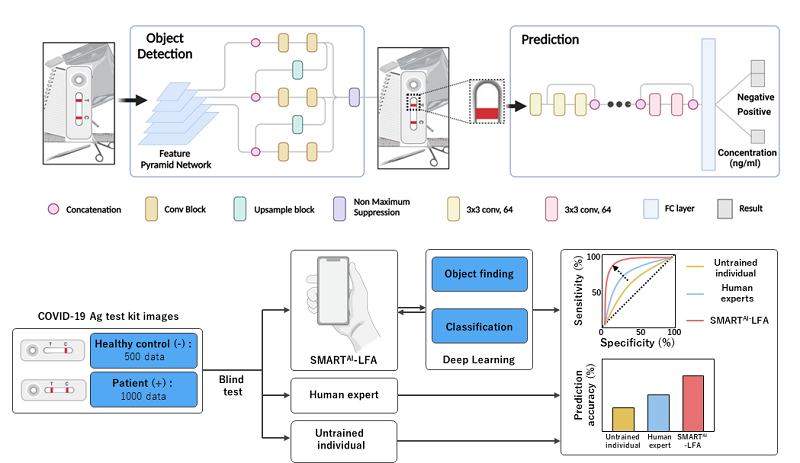Smartphone-based AI for High-Sensitivity Virus Diagnosis in the Field
- admin
- 2023-05-15
- 6063
-Developed a proprietary deep learning
algorithm-based high-sensitivity on-site diagnostic technology using
smartphones-
-Blind evaluation results for COVID-19 show a
significant increase in sensitivity from 72% for the general public to 100%-
-The sensitivity for difficult-to-diagnose
infections in the early stages significantly increased from 51% for the general
public to 91% when AI was applied-
-Ensured versatility in diagnosis using
smartphones or rapid kits that are widely available on the market-
-Presented a new paradigm for on-site
diagnosis that can judge and suggest the early diagnosis of new and variant
viruses, the progress of diseases, and the need for isolation-
-Published in Nature Communications (IF: 17.69)-
Professor Lee Jung-hoon's research team
(Department of Electrical Engineering) has successfully developed an AI
diagnostic technology based on smartphones through joint research with Kellss
Co., Ltd., Professor Lee Ki-baek's team at Kwangwoon University, Professor Jo
Sung-yeon's team at Seoul St. Mary's Hospital, Professor Yoo Yong-kyung's team
at Catholic Kwandong University, and Professor Yoon Dae-seong's team at Korea
University. Through this technology, it is possible to perform highly sensitive
on-site diagnosis using only a smartphone and a rapid kit without any external
devices.
This technology has been transferred to Kels
Co., Ltd., and commercialization is planned through approval and certification
processes such as app/algorithm optimization, and the U.S. Food and Drug Administration
(FDA) and the Korean Food and Drug Administration (KFDA). This research was
supported by the Bio-Medical Technology Development Program of the National
Research Foundation of Korea (No. 2021M3E5E3080743) and published in Nature
Communications, a top-tier journal published by Nature Portfolio (IF: 17.69).
Web link: https://www.nature.com/articles/s41467-023-38104-5
 ?
?
<From left to right, the research team consists of Professor Jeonghoon Lee (Kwangwoon University), Seungmin Lee (PhD candidate), Sunmok Kim (PhD candidate), Professor Daesung Yoon (Korea University), Professor Kiback Lee (Kwangwoon University), and Professor Yongkyung Yoo (Catholic Kwandong University)>
 ?
?